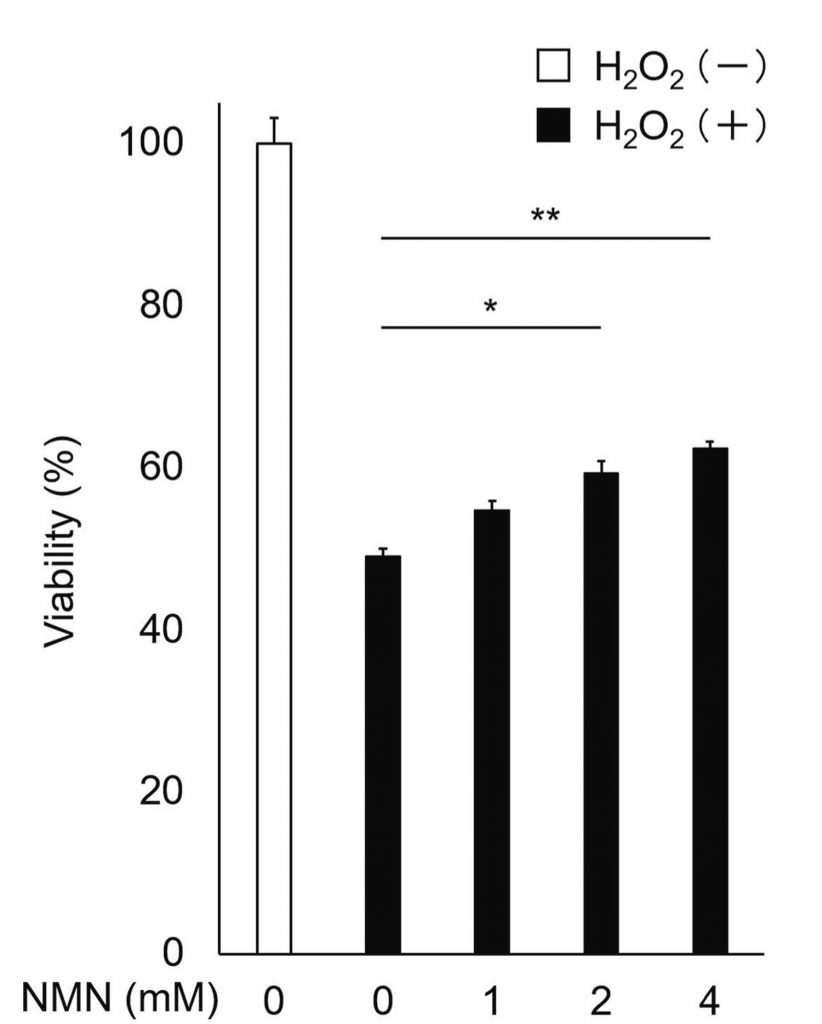Key Points:
- Treating blood vessel cells with NMN reduces senescence — an age-related stagnant state that exacerbates aging via inflammation.
- NMN increases the survival of blood vessel cells challenged with oxidative stress — cell damage and death caused by excessive reactive oxygen species (ROS).
- The anti-aging compounds N-acetyl-cysteine (NAC) and NMN similarly neutralize ROS.
Cardiovascular disease (CVD) is responsible for the most deaths worldwide and is associated with age-related NAD+ depletion. Therefore, NAD+ boosters like NMN could counter CVD by replenishing lost NAD+.
Now, Nakajo and colleagues from the DHC Corporation in Japan report in Toxicology in Vitro that NMN inhibits oxidative stress-induced damage. Namely, in response to oxidative damage, NMN reduces markers of senescence, increases cell survival, and neutralizes ROS. Furthermore, reduced senescence and increased survival are mediated by the longevity-associated enzyme sirtuin-1 (SIRT1).
“Our findings provide new insights into the mechanism by which NMN exerts protective effects against vascular oxidative stress,” said the authors.
NMN Counters Vascular Aging
With aging, the cells within the innermost layer of our blood vessels called endothelial cells (ECs) begin to wane, contributing to CVD risk. Therefore, Nakajo and colleagues examined the effects of NMN on human ECs.
Furthermore, oxidative stress is thought to underlie the waning of ECs. Therefore, the researchers exposed ECs to a high dose of hydrogen peroxide (H2O2) to increase ROS within cells and induce oxidative stress.
To assess senescence, the researchers measured two of the main protein markers for senescent cells, p16 and p21. In response to H2O2, both p16 and p21 were elevated in ECs, indicating senescence. However, NMN suppressed H2O2-induced increases in p16 and p21, suggesting that NMN counters senescence.

Our organs and tissues, including our blood vessels, are composed of many cells. Therefore, by damaging our cells to the point of eventual cell death, oxidative stress leads to the deterioration and dysfunction of our organs. Such deterioration manifests in diseases like CVD.
For example, when ECs become dysfunctional, they produce less of the signaling molecules necessary for blood vessels to dilate, leading to artery stiffness. Artery stiffening occurs with aging and is closely associated with CVD progression.
Nakajo and colleagues found that when ECs were exposed to H2O2, only about half survived, demonstrating the toxic effects of oxidative stress. However, treating the H2O2-exposed ECs with NMN increased their survival and viability, suggesting that NMN counters the consequences of oxidative stress.

To directly measure ROS within cells, Nakajo and colleagues used a fluorescent probe called CM-H2DCFDA. In response to H2O2 exposure, ROS production nearly doubled within the ECs. However, NMN reduced EC ROS levels and did so similarly to the potent antioxidant (ROS neutralizer) NAC.

To determine how NMN exerts its antioxidant effects, Nakajo and colleagues repeated their measurements in the presence of a drug that blocks SIRT1. SIRT1 is associated with activating the genes for our native antioxidants found within cells.
It was found that blocking SIRT1 negated the effects of NMN on cell viability and senescence. These findings demonstrate that NMN counters oxidative stress and senescence by activating SIRT1, which is fueled by NAD+.
NMN Counters Cardiovascular Disease in Humans
A previous study done by the DHC corporation showed that NMN reduces artery stiffness in middle-aged adults who are overweight or who have high blood glucose levels. This means that individuals who suffer from metabolic dysfunction may benefit from NMN supplementation. As artery stiffness is a risk factor for CVD, reducing artery stiffness could counter CVD.
Furthermore, Harvard scientists have shown that NMN lowers blood pressure in overweight and obese adults. Since high blood pressure is a major risk factor for CVD, this study supports the idea that overweight and obese individuals, who likely suffer from metabolic dysfunction will benefit from NMN supplementation.